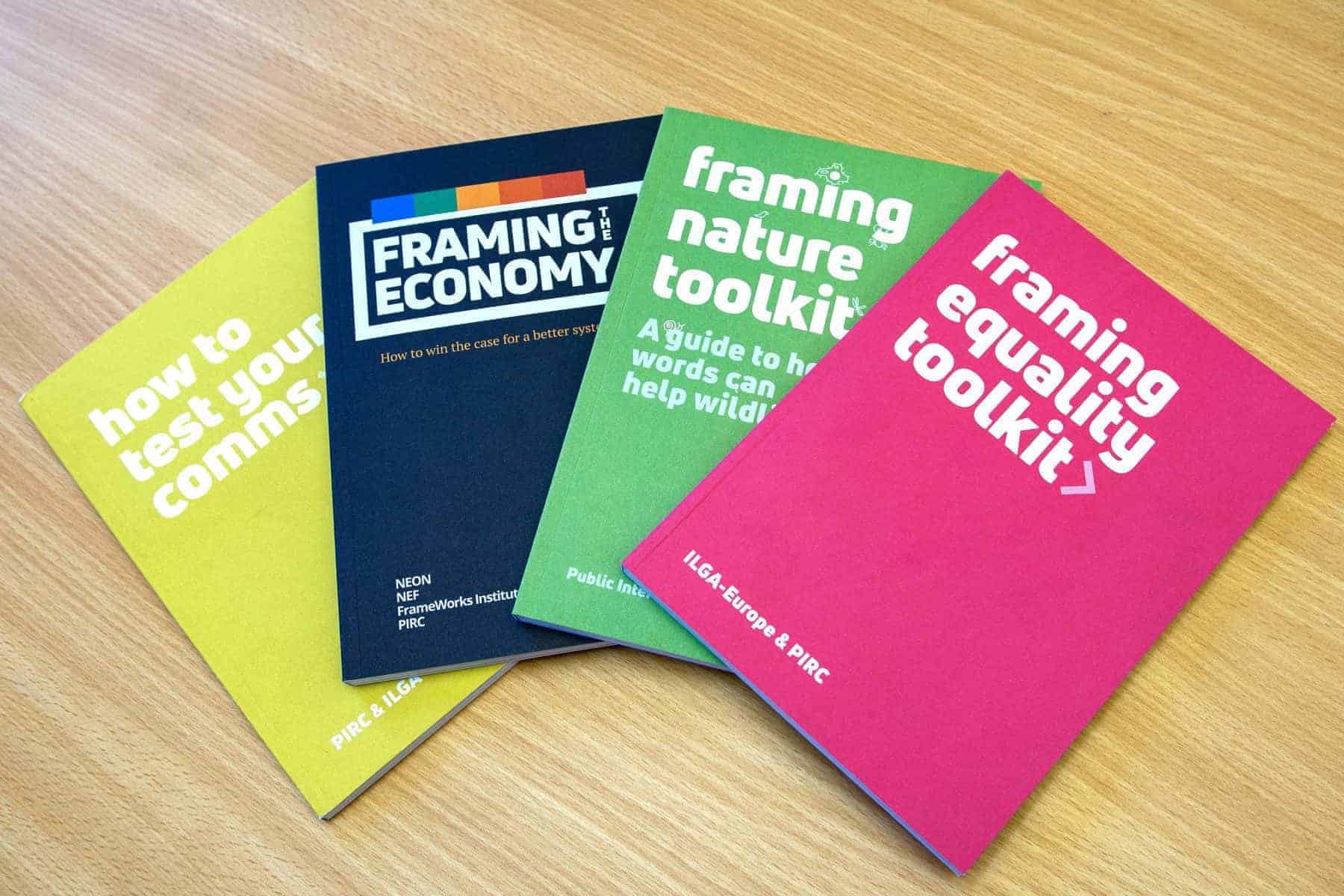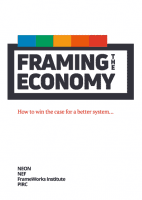The Public Interest Research Centre (PIRC) is seeking new trustees. We are particularly interested in folks with experience of fundraising, and of narrative/framing work.
Latest Posts
Building Our Narrative Power The final residential Peer-learning and community dreaming on a narrative change residential
We ate delicious food, watched Twilight and experimented with new learning styles, in a collective journey towards better UK-based narrative change infrastructure.

How can we build communities of learning, growth and care, focused on narrative change? This is the question we set out to ask at the start of Building Our Narrative Power (BONP) – our year-long narrative leadership programme. We’ve been led by 14 participants and a bunch of amazing facilitators, and we’re about to draw to a close. But before we share reflections on the whole programme, I’d love to tell you a bit about our second, and final, residential, that happened in November 2024.
So, let’s set the scene. We are in the beautiful countryside, the weather is as British as ever, fourteen change-makers from across the UK show up keen to reconnect and learn…
Read moreWorkshop Framing Modern Slavery how to talk about modern slavery to improve its public understanding in the UK
Join us to learn how to talk about modern slavery in ways that builds understanding and sparks effective change.
Wednesday 18 December 2024, 12.30 – 14.00 (Online)
Read moreChallenging Divisive Narratives Confronting Far-Right Extremism in the UK 1 Building narratives that unite us
Content warning: this piece contains mentions of racism, Islamophobia, Nazism and genocide
The recent wave of far-right extremism in the UK—manifesting as violent riots targeting mosques, places of refuge, Muslims, and people of colour—has been deeply troubling to watch. But for many, ourselves included, the events are unsurprising. These racist attacks resulted from years of divisive narratives pushed by the media and politicians, and repeated excessively throughout UK society.
Read moreBuilding Our Narrative Power Half way there! Reflections from the first half of our narrative leadership programme
It’s been five months since we officially launched Building Our Narrative Power (BONP) and began working with our cohort of 14 community organisers, campaigners, and activists.

January
We hosted our first residential in January, nurturing a space to build trust, community, and to strengthen group dynamics. Together, we celebrated a shared sense of leadership, renewal and building connections and bridges between our issues and work. In laying these initial foundations, participants opened up and engaged in honest, meaningful discussions, while beginning to take ownership of crucial aspects of the programme – including leading their own sessions. It was a joy to see the non-hierarchical and co-created approach that we envisioned underpinning this journey, being reflected so early on.
You can read more about the residential here.
Since then, a strong spirit of community has continued to flourish. Following the residential, participants set up their own ‘Community of Practice’ calls between BONP sessions, sharing tools, resources, and opportunities with each other. They’ve organised their own in-person meetups and peer-to-peer learning. Through this self-contained space, they’ve created a shared “narrative north star” to guide them through the year.
Read more…you could really tell how invaluable being part of a group was. I think bringing isolated campaigners to the space was a good idea.” – Facilitator
Building Our Narrative Power Fourteen change-makers Reflections from the first residential of our narrative leadership programme
Since launching Building Our Narrative Power last summer, we have had the incredible opportunity of working with 14 community organisers, campaigners and activists. The folks we’re working with come from a variety of different backgrounds and social justice struggles. We have been working together to shape the programme, bringing in their ideas, skills and experiences to co-design a year of learning and leadership development.

Global Narrative Change PIRC goes to a conference in Bogota: and learns a lot! Confluence 2023
On a Wednesday afternoon, just before logging off, I received an email: “Save the date for a global convening on narrative change that IRIS, Puentes and Global Narrative Hive are co-organising this October in Bogotá.” A work trip to Colombia? Yes please! The opportunity to learn about narrative change outside of the UK and to learn from global narrative change practitioners felt too good to be true!
The first day of the conference arrived, and I felt the awkwardness and excitement of a first date. I was not sure who to approach, where to sit, or what to do with my hands. Then the facilitators welcomed us to the space and I began to relax. Matthew Armstead led us in the diversity welcome. I felt welcome as they named aspects of my identity: bisexual, survivor, in my 20s, feeling nervous, religious background.
Read moreGuest Blog Epistemic injustice: an invitation to ask new questions Emily Kenway
Who is allowed to know things in our society? Duwayne Brooks wasn’t. When Duwayne’s friend, Stephen Lawrence, was murdered in a racist attack in south-east London in 1993, he told the police what he’d seen: six white thugs killing his friend while shouting racist abuse. But his testimony was discounted because, as a young Black man, Brooks was not considered a credible witness by the Metropolitan police.
The political philosopher Miranda Fricker describes Brooks’ experience at the hands of the state as ‘testimonial injustice’ – an injustice perpetrated when someone’s account is rejected because of prejudices about their characteristics. Systemic oppression makes you unbelievable, no matter what you saw, no matter what you say. Examples abound: consider sex workers who are told they can’t have been raped because they’re sex workers; women who urge doctors to believe their physical pain, only to be told it’s in their heads; children whose disclosures of abuse are smoothed over for the sake of adult peace; trans people whose gender identities are derided… the list goes on.
This is, for Fricker, part of an overarching problem which she calls ‘epistemic injustice’, and which I’m introducing here as one portal (of many) into understanding why we need to ensure narrative change is led by those currently excluded from that work. Episteme means knowledge, so ‘epistemic injustice’ is a way of conceptualising the many oppressions perpetrated in the realm of knowledge. Who gets recognised as knowing things? Which knowledge counts? How must knowledge be packaged and communicated to be credible? I’m sure we can all think of many encounters with gatekeepers of these capacities, both our own and those we’ve witnessed.
Read moreBuilding Our Narrative Power Dreams of a foodie Dreaming... #2
When I started thinking about what to write I had been cat sitting for my best friend who has a pretty decked out kitchen – and I was planning to make the most of all the fancy appliances. While that did not happen, I instead was left with the feeling of being nourished. I ate well, spent time in nature, I moved my body and finally did some reading of a book I’m excited to borrow once my best friend is done with it.

Building Our Narrative Power Why a participant-led course? Dreaming... #1
When we think of learning, we often think of schools, colleges, universities. But learning is an ancient thing, that existed before all of these institutions and will exist long after. Its something that crosses species: like how honeybees dance to teach others where to find the best flowers. Every species on earth is what it is today because it learnt from the generations that came before.
Read moreApply Now We’re launching ‘Building Our Narrative Power’ Applications now open
Are you a changemaker, a storyteller, or someone who’s looking to shift the way people think, feel, and act? Then we’d love to learn, grow, and build collective narrative power with you.
APPLICATIONS ARE NOW CLOSED.
Thanks to everyone who has applied, we’ll be in touch soon.
If you’re interested in supporting the programme as a mentor, trainer, or content partner, email our Workshops Lead, , with a bit of info about you, how you’d like to be involved and any useful links 🙂
We’re excited to launch the ‘Building Our Narrative Power’ course—supporting people who have lived experience of the issues they are fighting for, to skill-up and shape the narrative for justice and social change, to create waves of action and lasting progress. We’re looking for 16 people who are all passionate about transforming societal narratives across social, climate, and economic justice.

Decolonising Narratives: Part 3 How can we decolonise narrative work? Decoloniality as queering
We are living off expired stories. Stories that expire can no longer dance with you. They are lethargic or stuck, they can’t move things in generative ways any more, but we often feel we cannot let them go. Many of these expired stories give us a sense of security, purpose and direction—precisely because they seem stable and solid.
Vanessa Andreotti
Reeling in the grief of the summer of 2020, I reflected on how the work of narrative change was itself “living off expired stories”; its practices embedded in racism.
Here, I’d like to try shifting gears and evolving where we’re at. What might the work of learning and doing narrative change look like if we moved it beyond coloniality, capitalism, patriarchy and whiteness?
Decolonising Narratives: Part 2 The Crumbling Foundations Unpacking the narratives at the foundation of our broken systems
“Narratives are powerful. They can swing juries and elections. They can fill prisons. But they can also fill the streets.”
As we shared in our first blog of the series, we believe that our societies are built on narratives. These narratives—of our past, present and future—provide the scaffolding for our political systems, for our social structures, and for our own thinking. They shape how we understand and value our relationships, how we classify ‘us’ and ‘them’, how we treat others, our expectations for ourselves, our communities, our leaders.
#event Decolonising Narratives A conversation
Join us at 12pm Thursday 24th November to discuss how to diversify, democratise and decolonise narrative and communications work in the UK: sign-up here. Read more
New Publication Media That Moves 1 Creating anti-racist representations of Gypsies and Travellers in the UK media
The Media that Moves project is one of the best things we have been involved in. It gives us the strength to go forward on the right road to tackle the negative news that journalists publish about us every day.”
Mena Mongan, Community Engagement Officer at London Gypsies and Travellers
We know the media environment around Gypsy and Traveller people is harmful, discriminatory and racist. This in turn fuels the damaging policy, exclusion and prejudice the communities face to this day. The bigger question is why? And what can be done to move towards anti-racism in the UK’s media?
Launched today, Media That Moves is a report from PIRC in partnership with Leeds Gypsy and Traveller Exchange and London Gypsies and Travellers. Based on 30 interviews with journalists, editors and activists and workshops with the Gypsy and Traveller community, the report examines the role of the media in perpetuating negative stereotypes, influences on the media, dominant narratives, and where they come from. Read more




